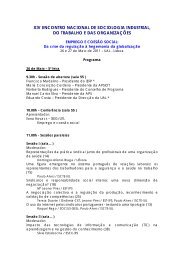Web-based Learning Solutions for Communities of Practice
Web-based Learning Solutions for Communities of Practice
Web-based Learning Solutions for Communities of Practice
You also want an ePaper? Increase the reach of your titles
YUMPU automatically turns print PDFs into web optimized ePapers that Google loves.
322<br />
Conditions and Key Success Factors <strong>for</strong> the Management <strong>of</strong> <strong>Communities</strong> <strong>of</strong> <strong>Practice</strong><br />
ties <strong>of</strong> practice, thus identifying existing ones,<br />
extracting results from previous experience and<br />
fostering new ones, as needed. However, as mentioned<br />
earlier, the cornerstone <strong>of</strong> communities is<br />
people and their willingness to share knowledge.<br />
There<strong>for</strong>e, the real organizational challenge is to<br />
strengthen, develop, cultivate, and support these<br />
organic groups and try to translate their energy<br />
and results to an organizational level. Moreover,<br />
although their creation and maintenance must be<br />
monitored, it must also be clear that the objective<br />
should not to design, implement, and analyze<br />
results, but rather to build on a day-to-day basis,<br />
even if it seems otherwise.<br />
Interest in the Creation <strong>of</strong><br />
<strong>Communities</strong> <strong>of</strong> <strong>Practice</strong>: Individual<br />
or Organizational?<br />
Following our answers to the previous questions,<br />
another difference in how communities are created<br />
is where the idea originates from. According to<br />
theory, it could be said that communities are an<br />
individual (or group) initiative, but organizational<br />
initiatives were also documented in the experiences<br />
studied in our case analysis.<br />
The initiative <strong>of</strong> implementing knowledge<br />
management programs can be at an organizational<br />
level and it may include the implementation <strong>of</strong><br />
communities <strong>of</strong> practice (U.S. Department <strong>of</strong><br />
Defense, <strong>for</strong> instance). If the initiative is taken<br />
at an individual level, at least there will be an<br />
important motivation at the beginning, even if<br />
members do not manage to sustain the community<br />
due to lack <strong>of</strong> organizational support (Andersen<br />
Consulting Education).<br />
There are also companies that compensate participation<br />
in communities in order to motivate their<br />
staff (DaimlerChrysler). In this case, individual<br />
motivation could depend on the recognition and<br />
not on the interest in the practice or in the members<br />
<strong>of</strong> the community and, as a result, it may disappear<br />
when the recognition ceases to satisfy the<br />
compensation objectives <strong>of</strong> the staff. Furthermore,<br />
it is possible that competition between personnel<br />
is being encouraged by detecting who contributes<br />
the most to the community, etc. This does not<br />
mean that members’ motivation will assure by<br />
itself more sustainable CoP’s just because the<br />
interest is in the practice or in the members, al<br />
least, emphasizing organizational purposes and<br />
goals. There could be members who leave the<br />
community, or the practice and customs could<br />
change along time, thus influencing the members<br />
as well. The fact <strong>of</strong> having an organizational support<br />
could help to overcome these necessaries and<br />
frequent changes in corporate evolution. Also, if<br />
a firm tries to achieve a broad scope <strong>of</strong> staff committed<br />
with the project, it should be considered<br />
that each individual shall be taken into account.<br />
The point is that it is not the same <strong>for</strong> motivations<br />
to be financial or to be intangible, and that there<br />
will be people who will not work without being<br />
compensated and others who will.<br />
In our research, the experiences studied are<br />
coherent with McDermott’s (2000) earlier analysis<br />
and conclusions. The long-term operation <strong>of</strong> a<br />
community requires an important commitment<br />
from the leader but it would never exist without<br />
the commitment from its members, since their<br />
contributions sustain the community. This commitment<br />
<strong>of</strong> each member to the community is part<br />
<strong>of</strong> the Community challenge, but our research<br />
also suggest that it should be useful to integrate<br />
as a community challenge getting the organization<br />
support to the CoP so that their members<br />
can obtain the resources (flexibility, financing,<br />
and infrastructure) necessary to continue its<br />
activities.<br />
We don’t under valuate the importance <strong>of</strong> community<br />
identity and trust that are also important<br />
and relevant issues related to this challenge. If<br />
members do not feel that they are part <strong>of</strong> the<br />
group and do not trust other members, it will be<br />
difficult <strong>for</strong> them to contribute to the transfer <strong>of</strong><br />
knowledge.<br />
We have also proved that the content and even<br />
process <strong>of</strong> knowledge sharing are very different



